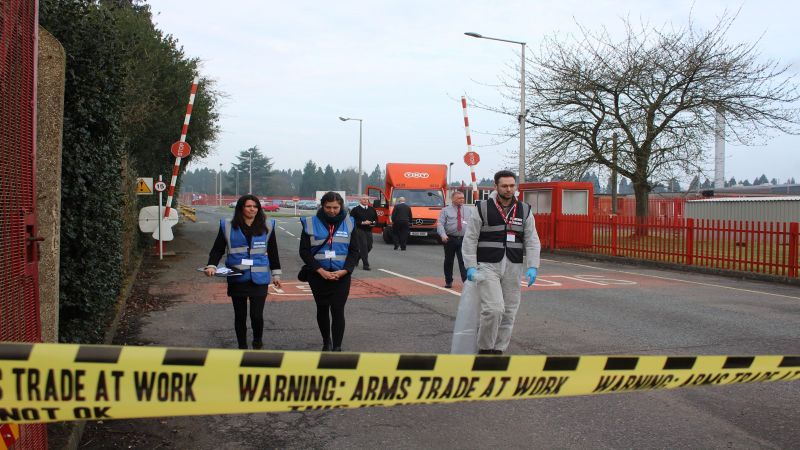
Local Editor
Activists have taken it upon themselves to hinder the U.K.’s support for the Saudi-led war in Yemen by chaining themselves together outside the gates of a factory in Worcestershire, England. They then demanded to do a ‘people’s’ inspection of the site.
The factory, run by Roxel, is suspected of manufacturing missile propulsion engines for Saudi Arabia, who has been leading a vicious war in Yemen that has killed nearly 15,000 since 2015 and caused one of the greatest humanitarian crises of the 21st century.
According to a written statement from the activists of the organization "Put Down Your Sword:"
“The People’s Weapons Inspectors decided that they had to act when on the 12th March 2018 an order in progress for one thousand Brimstone missiles for Tornado jets appeared on the Stockholm International Peace Research Institute (SIPRI) Arms Transfer Database. Police officers attended the scene and many workers are unable to fully access the site and continue their work building missiles.”
“We’re doing weapons inspections on behalf of ordinary people. So we’re doing it on behalf the people in Yemen who don’t agree with the Saudi airstrikes,” said Nicholas Cooper, an activist who was there during the blockade.
The human blockade on the factory ended in the afternoon, but disrupted production temporarily.
When asked why more people in the U.K. were not outraged about their government's support for the war in Yemen, Cooper said that most people actually don’t support the war, but that the government has gone to great lengths to distance their involvement in it.
A recent poll conducted by YouGov show that a majority of Britons do not support the war.
In a written statement, Cooper said, “Roxel has serious questions to answer. It produces key technology in Brimstone missiles, and it looks like there was a large transfer of these missiles to the Saudi regime last year.
These missiles could be getting used right now in war crimes. We won’t be leaving the site today until we have spoken to the people in charge and been given answers.”
Al Bawaba spoke with the head of Human Resources and Communication with Roxel, Paul Adams, who refused to comment on whom the arms manufactured in the factory were going to, but acknowledged that missile propulsion systems were indeed being made.
When asked about the nature of the protests, Smith said, “they stood outside our gates and sang songs.”
In 2015, Saudi’s Mohammad bin Salman, initiated a war in Yemen to combat Iranian-backed Houthi rebels in the country.
As part of its military strategy, Saudi began systematically starving Yemen. Martha Mundy, a professor at the London School of Economics who began studying the patterns of Saudi’s military strikes, began noticing a trend.
She eventually came to the conclusion that her data “is beginning to show that in some regions, the Saudis are deliberately striking at agricultural infrastructure in order to destroy the civil society.”
Saudi has reportedly been targeting farmland, cattle, water infrastructure, food stores, agricultural banks, markets and food trucks.
After preventing the country from functioning on its own, bin Salman then directed an ongoing blockade that has prevented the import of critical supplies such as food, fuel, water and medical supplies from reaching the people.
Though he has periodically eased the blockade, he persists in slowly starving out the country.
For its park, the U.K. has supplied Saudi Arabia with around $15 billion worth of arms since 2008, and increased its support since 2015. The architect of the war, bin Salman, visited the U.K. earlier this year and was met with a warm welcome by the British royal family.
A Saudi PR agency reportedly spent millions ensuring that press and public reception of bin Salman would be positive despite his directing of potential war crimes in Yemen. A majority of civilians in the country, about 75% require humanitarian assistance, and the country experienced one of the worst cholera outbreaks in modern history.
Source: News Agencies, Edited by Website Team